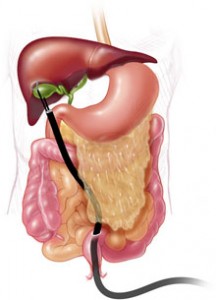Natural orifice transluminal endoscopic surgery (NOTES) has become increasingly popular during the last few years. This is not surprising, as a surgical procedure which does not need an incision is less threatening for the patient. Unsightly skin scars are not a concern and recovery is usually less complicated. Procedures have become more varied. Transvaginal procedures have been performed for a number of years, such as vaginal hysterectomies.
In 2004 Anthony Kalloo, a gastroenterologist from John Hopkins University reported on the feasability and safety of gastrointestinal surgery and research has proceeded at a stunning rate. The idea behind NOTES is to use a body orifice (the oral cavity in the case of gastro-intestinal surgery) as an entry point to the surgical area. An incision into the abdominal wall is avoided.
The concept of minimally invasive surgery is not new, as laparoscopic procedures for gallbladder surgery and hernia repair are currently in use. Joint surgery through arthroscopic surgery is common and surgery to the pineal gland in the brain has been performed by using the nostrils as an entry to the area.
Experience in gastrointestinal surgery through natural orifice transluminal endoscopic surgery at this point is limited. Seven transgastric appendectomies have been performed by the surgeons Dr. N.Reddy and Dr.V.G Rao in Hyderabad, India.
The research group from John Hopkins is aware that this new technique will revolutionize surgeries, but there is the sentiment that things should not be rushed. The procedures need to be thoroughly researched to ensure that they are safe and beneficial to surgical patients. To this effect the Natural Orifice Surgery Consortium for Assessment and Research (NOSCAR) has been formed in the US, which promotes research and monitors safety of these new approaches of less invasive surgeries.
Reference: MD Consult news, January 3, 2007: “New procedure aims to avoid surgery”
Last edited December 5, 2012






